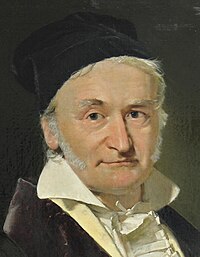Carl Friedrich Gauss
Carl Friedrich Gauss (pronunciation: ![]() Carl Friedrich Gauss (Gauß) (help·info), Latin: Carolus Fridericus Gauss) (30 April 1777 – 23 February 1855) was a famous mathematician from Göttingen, Germany. Gauss contributed to many areas of learning. Most of his work was about number theory, statistics, and astronomy.
Carl Friedrich Gauss (Gauß) (help·info), Latin: Carolus Fridericus Gauss) (30 April 1777 – 23 February 1855) was a famous mathematician from Göttingen, Germany. Gauss contributed to many areas of learning. Most of his work was about number theory, statistics, and astronomy.


Childhood
changeHe was born in Braunschweig. That city was then part of the duchy of Braunschweig-Lüneburg. Today the city is part of Lower Saxony. As a child, he was a prodigy, meaning he was very clever. When he was 3 years old, he told his father that he had made a mistake on his complicated payroll. The child was correct. Gauss also taught himself to read.
When he was in elementary school, his teacher once tried to keep the children busy, telling them to add up all the numbers from 1 to 100. Gauss did it quickly, like this: 1 + 100 = 101, 2 + 99 = 101, 3 + 98 = 101, and so on. There were a total of 50 pairs, so 50 × 101 = 5,050. The formula is . There are many other versions of this story.[1]
The Duke of Brunswick gave Gauss a fellowship to the Collegium Carolinum, where he attended from 1792 to 1795. This meant that the Duke paid for the education of Carl Friedrich Gauss at the Collegium. After this, Gauss went to the University of Göttingen, from 1795 to 1798.
Adulthood
changeWhen Gauss was 23, scientists spotted the asteroid Ceres but they did not see it for long enough to know its orbit. Gauss made calculations that let them locate it.
Later in life Gauss stopped working on pure math and turned to physics. He did work in electromagnetism and made an early electrical telegraph.
Work
changeGauss wrote Disquisitiones Arithmeticae which is a book about number theory. In that book he proved the law of Quadratic reciprocity. He also was the first mathematician to explain Modular arithmetic in a very detailed way. Before Gauss, mathematicians had used modular arithmetic in some cases but did not know much about using it broadly.
Gauss made important discoveries in Probability theory.
Related pages
changeReferences
change- ↑ "Gauss's Day of Reckoning". American Scientist. 2017-02-06. Retrieved 2023-01-22.